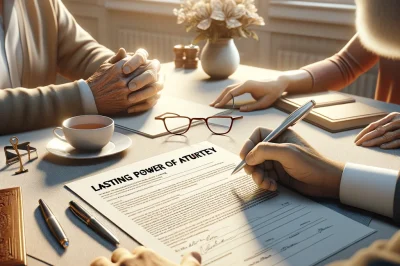Table of Contents

A Lasting Power of Attorney (LPA) is a legal tool that lets you choose someone you trust to make decisions for you.
It’s important to have in place an LPA for a number of reasons. For example, have you considered what will happen if you suffer an accident or illness, which means you can’t make decisions for yourself any more about your health or your finances?
An LPA enables you (the “donor”) to choose one or more “attorneys”, to make or help you to make decisions on your behalf if you lack mental capacity and can’t do it yourself.
This isn’t something only older people in poor health need to consider. Unfortunately you can have an accident or illness at any age so many people are now opting to have an LPA in place to protect them and their families from potential issues in the future.
You can choose anyone you want to be your attorney, as long as they are over 18.
Consider what an attorney has to do before making your choice and choose someone you trust who will act in your best interests.
Types of Lasting Power of Attorney
There are two different types of LPA: property and financial affairs LPA and health and welfare LPA. LPAs can make things easier for you and the people you are close to as your dementia progresses.
· Health And Welfare LPA can be used to give an attorney the power to make decisions about things like your daily routine (washing, dressing, eating, etc), your medical care, when to move into a care home or life-sustaining treatment. A health and welfare LPA can only be used when you’re unable to make your own decisions.
· Property And Financial Affairs LPA gives an attorney the power to make decisions about your money and property including managing your bank or building society account(s); collecting your benefits or pension; paying your bills; or selling your home. A property and financial affairs LPA can be used as soon as it’s registered, with your permission. If it is to be used at a later date then you can decide the criteria for when this will be.
How to Make a Lasting Power of Attorney
Once you have chosen your attorney(s) and advised them of this, you will need to decide the capacity in which you want them to act ie jointly or ‘jointly and severally’. Being able to act severally means each attorney can use the Power of Attorney independently which is a great advantage when the attorneys live apart.
To register a Lasting Power of Attorney, you need to fill out a specific form, get all relevant signatures and then register your LPA with the Office of Public Guardian (OPG).
The OPG can also help with any questions or complaints about your LPA.
It can take between eight and 10 weeks to register a Lasting Power of Attorney. Though you can use an online service to create and register your LPA, many charities and other organisations have highlighted the fact that a DIY LPA can place vulnerable individuals at greater risk of financial abuse from unscrupulous family members or friends.
Worryingly there is nothing to prevent someone from completing the LPA online on your behalf and appointing themselves to be your decision maker (known as an attorney) and then wrongly taking over control of your financial affairs.
This is why we recommend using the service of a professional organisation like Swansea Legal Solutions to help you set up any type of LPA. This will not only ensure that the forms are filled in correctly but also will prevent anyone with a vested interest in taking over your affairs without your permission.
To find out more about our Lasting Power of Attorney services, click here https://swansealegalsolutions.co.uk/wills-probate-and-estate-planning or you can call a member of our team on the number below:






